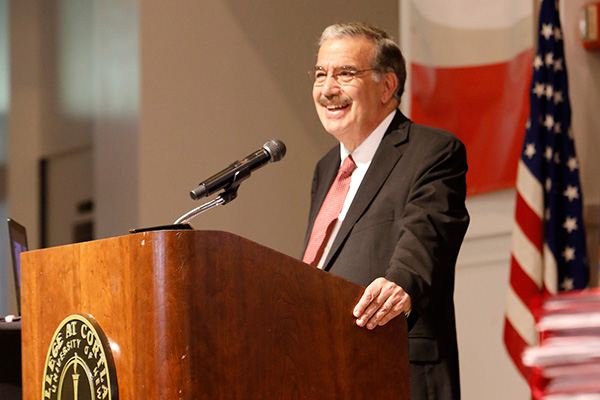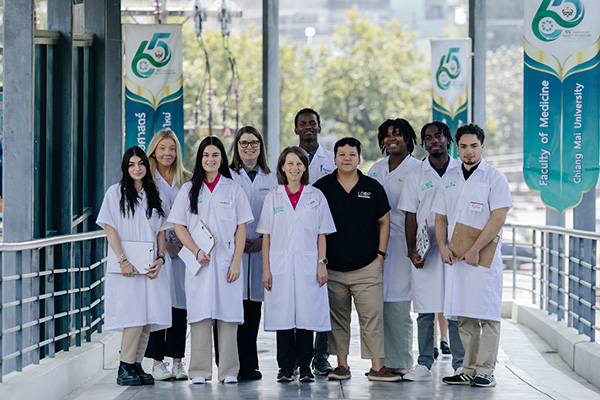
01/23/2025
President Erik J. Bitterbaum started the Spring 2025 semester by sharing recent successes and discussing student needs at SUNY Cortland’s annual State of the University Address for faculty and staff members.
During his hourlong remarks on Jan. 23, Bitterbaum discussed four leading student concerns, according to national data: college affordability, future job prospects, safety and mental health. He encouraged faculty and staff members to be aware of the trends, and to consider ways to keep students engaged during their SUNY Cortland experience.
Bitterbaum recounted a short but powerful student compliment recently shared with a faculty member: “I came to class because you make me feel like I matter.”
“I would say this is a principle of higher education,” Bitterbaum said. “And it can be simple sometimes.”
The president gave the example of memorizing student names and learning details about them, a common practice he observed in SUNY Distinguished Teaching Professor Emeritus Steven Broyles. Recognizing the new experiences and challenges faced by first-generation students also proves important, Bitterbaum said.
“I like to call this intrusive advising — getting to know (students) and caring about them in your own special way,” Bitterbaum said. “What I have noticed over time is that a faculty member who does this leads to increased persistence to graduation.
In addition to discussing challenges faced by college students nationally, the president noted trends in higher education such as people questioning the value of a college degree and enrollment shortfalls due to the declining number of high school graduates in many areas of the U.S., especially the Northeast.
Bitterbaum was quick to highlight encouraging signs as well: greater economic mobility for bachelor’s degree recipients, strong public support for investment in higher education and increased earning potential for future college graduates. He urged faculty and staff members to recognize the “soft skills” sought by many employers — communication, critical thinking, collaboration — and weave them into experiences that engage students.
“Learning is not a spectator sport,” Bitterbaum said. “Genuine learning is not passive, but active. ... It’s the process of discovery where the student is the main agent.”
The role of higher education in a democratic society also inspired updates, with Bitterbaum highlighting the SUNY system’s new required general education core competency in civic discourse starting in Fall 2026. Discussion of civic engagement initiatives included a mention of the university’s Cortland Applied Learning Practitioners’ Community of Practice, which provides up to five fellowship awards for faculty members who incorporate civic decision-making in their syllabus.
Additional campus updates and achievements covered a range of topics:
-
Faculty excellence: Recent individual honors included several fellowships. Teagan Bradway, associate professor of English, earned the Cornell Society for the Humanities Fellowship; Kathleen Burke, SUNY distinguished teaching professor of economics, was awarded the Business-Higher Education Forum Innovation Fellowship; and Carrie Rood, assistant professor of foundations and social advocacy, was recognized with the SUNY Accessibility Advocates and Allies Faculty Fellowship.
-
New accreditation: The university’s School of Education recently earned a new national accreditation from the American Association for Quality in Educator Preparation, ensuring that the largest comprehensive teacher education program in the SUNY system meets high standards.

A healthcare study abroad course brought biological sciences students to Chiang Mai, Thailand, where they were exposed to diverse medical experiences.
-
Study abroad participation: The number of SUNY Cortland students pursuing an international academic experience has increased by approximately 20% annually since the COVID-19 pandemic. During winter session, students traveled to Belize, Germany, Mexico, Ireland and Thailand. SUNY Cortland students are studying in 14 countries during the spring semester.
-
Naming academic spaces: Two dedications in honor of generous alumni were shared from the fall semester: the Barbara A. Galpin ’68, M ’74 Institute for Civic Engagement and the Phylis D. ’58 and Fredric R. Fralick ’59 Teaching Materials Center.
-
West Campus Mini Cupboard: During winter break, the SUNY Cortland Cupboard offered a small, temporary offshoot to provide a food pantry for residents of West Campus Apartments without access to transportation during break.
-
Construction progress: Van Hoesen and Cornish halls continue to be renovated as part of a $27 million upgrade scheduled to be completed in January 2026, bringing multimedia facilities for the Communication and Media Studies Department as well as new space for space for Conley Counseling and Wellness Services, the Disability Resources Office and the Educational Opportunity Program. A major $60 million renovation of Corey Union, the university’s meeting spot for many student organizations, is expected to begin in Spring 2026.
Bitterbaum also addressed important topics related to technology in higher education, including artificial intelligence and new national standards related to web accessibility. He discussed efforts taking place on campus that address both. A SUNY Cortland Generative AI Pedagogy and Student Learning Fair is expected to take place later in the spring, and efforts to make web-related content accessible for all continue.
The president concluded with uplifting notes recognizing the work of the university’s faculty and staff members.
“We are a remarkable place,” Bitterbaum said. “Each of you in your own way are doing unique things —advising, doing workshops, leading undergraduate research, affecting students.
“When I talk to our alums, it’s a faculty or staff member who inspired them or changed their lives. We forget that sometimes. … These stories remind me how extraordinary our faculty and staff members are.”